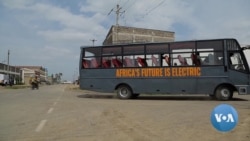A Swedish-Kenyan company, Opibus, has introduced the first African-designed and manufactured electric bus in Kenya with the aim of bringing clean energy to public transportation. Opibus, Kenya’s first company to make electric motorcycles, plans to launch the bus commercially in a few months and bring it to markets across Africa by 2023.
As other vehicles jostle for space while belching clouds of dark smoke in the streets of Nairobi, Benjamin Maina is driving a unique bus; one that is fully electric.
“I feel privileged driving this vehicle," said Maina. "It is also very amazing when you are driving this vehicle compared to the fossil fuel vehicles, considering there is a lot of vibration on fossil fuel vehicles and also a lot of noise. But with this vehicle, it’s quite silent and very sleek.”
Public transport in Kenya and across the African continent is largely run informally, and emissions standards are rarely enforced, making the vehicles highly pollutive as Jane Akumu, a Sustainable Mobility expert at the U.N. Environment Program explains.
“If you look at the cities, the heavy-duty vehicles which are buses and trucks, that’s the bulk of the pollution," said Akumu. "So, they are a big contributor to pollution. But as I said, they are also an opportunity. Because how do we shift to cleaner modes? Because we need mass transport to be sustainable to make cities more sustainable.”
The introduction of electric buses into the African market by Opibus is aimed at remedying the situation. Albin Wilson is the chief of strategy and marketing at Opibus.
“This electric bus is really (an) important first step in the transition from fossil fuel vehicles to electric clean mobility," said Wilson. "And I think we are really showing precedence being the first movers in this market with a bus that is even locally developed.”
Christopher Maina is a resident of Nairobi. VOA asked him about his experience as a passenger riding on an electric bus.
“This ride today is one of its own, having ridden on an electric vehicle," said Maina. "It's just cool, no noises like the combustion engines, there are no smells like the combustion engines. So, it's just cool and awesome to be in this vehicle.”
Africa’s electric car market, currently in its infancy, presents a huge opportunity for investment and the creation of green jobs, say experts. Here again is Jane Akumu.
“When you look at our source of electricity, it is renewable," said Akumu. "For example, in Ethiopia it is almost 100% renewable energy: hydro and such. If you look at Kenya it is over 90%. So, we have energy. We don’t have to import fossil fuel; petrol, diesel and all that. So, we have the energy here, then this is also very good opportunity for jobs, green jobs.”
Benjamin Maina notes one other benefit of his electric bus – lower costs for maintenance and fuel. It means more money in his pocket, he says, and a higher standard of living.





